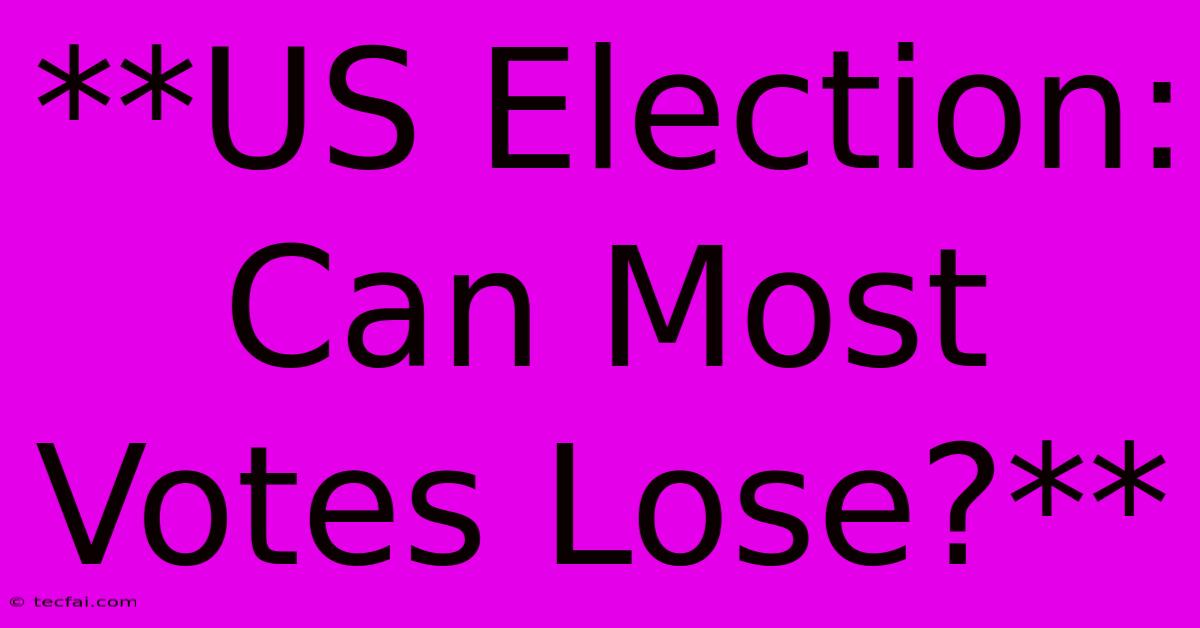**US Election: Can Most Votes Lose?**

Discover more detailed and exciting information on our website. Click the link below to start your adventure: Visit Best Website tecfai.com. Don't miss out!
Table of Contents
US Election: Can Most Votes Lose? The Complexities of the Electoral College
The US presidential election is a complex process, and one of its most debated features is the Electoral College. While the candidate who wins the popular vote often takes the presidency, there are scenarios where the winner of the popular vote loses the election. This begs the question: Can the candidate with the most votes lose the US presidential election? The answer, unfortunately, is yes.
Understanding the Electoral College
The Electoral College is a system established by the Constitution, designed to ensure that all states have a voice in the presidential election. Each state is allocated a certain number of electors based on its population. The District of Columbia also has electoral votes. The candidate who wins a state's popular vote typically receives all of that state's electoral votes, with the exception of Maine and Nebraska, which use a proportional system.
A candidate needs to secure 270 electoral votes to win the presidency. While the winner of the popular vote usually wins the election, this isn't always the case.
How Can Most Votes Lose?
Here's how the Electoral College can lead to a situation where the candidate with the most votes loses:
- Winning Key States: The candidate who wins the most states, even if they don't win the national popular vote, can still secure enough electoral votes to win the presidency. For example, in 2016, Donald Trump won the presidency despite losing the popular vote to Hillary Clinton. He achieved this by securing key swing states like Pennsylvania, Michigan, and Wisconsin, even though he lost the national popular vote by nearly 3 million votes.
- Concentrated Votes: If a candidate wins a few states by a landslide, they can accumulate enough electoral votes to win, even if they don't win the national popular vote. This happens when the candidate's support is concentrated in a few states, while the other candidate has more widespread, but less concentrated support.
The Debate Around the Electoral College
The Electoral College system has been a source of debate for years, with arguments both for and against its continued use.
Arguments for the Electoral College:
- Protects the Interests of Smaller States: The Electoral College system ensures that smaller states have a voice in the presidential election, as they are guaranteed a certain number of electors regardless of their population.
- Prevents Regional Domination: The system forces candidates to campaign nationwide, rather than focusing solely on densely populated areas, which could lead to the dominance of certain regions.
- Historical Significance: The Electoral College is a system that has been in place since the founding of the United States and has been a part of the country's political tradition for centuries.
Arguments Against the Electoral College:
- Undemocratic: The Electoral College allows a candidate to win the presidency without winning the popular vote, which many argue undermines the principle of one person, one vote.
- Unfair to Voters in Certain States: The system gives more weight to voters in some states over others, meaning that a vote in one state can hold more value than a vote in another.
- Unpredictable and Divisive: The Electoral College system can lead to unpredictable outcomes and can exacerbate political divisions.
Looking Ahead
The debate over the Electoral College is likely to continue. Some advocates for change argue that the system needs to be reformed or abolished, while others believe it is a vital part of the US political system.
Ultimately, the Electoral College is a complex issue with no easy solutions. It is important for voters to understand the system and its implications, and to participate in the ongoing debate about its future.

Thank you for visiting our website wich cover about **US Election: Can Most Votes Lose?**. We hope the information provided has been useful to you. Feel free to contact us if you have any questions or need further assistance. See you next time and dont miss to bookmark.
Featured Posts
-
Palantir Sees Record Profit Ai Demand Steady
Nov 05, 2024
-
Trump Family Tree Genealogy And Relationships
Nov 05, 2024
-
Sinclairs Loss Cupe Committed To His Vision
Nov 05, 2024
-
Draymonds Shot Impact On Warriors Offense
Nov 05, 2024
-
Last Minute Appeals Harris Trump Campaigning
Nov 05, 2024
